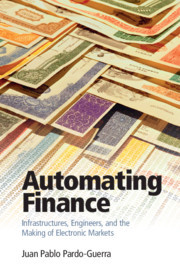Description
Automating Finance
Infrastructures, Engineers, and the Making of Electronic Markets
Author: Pardo-Guerra Juan Pablo
Explains how stock markets became automated through the work of invisible technologists, redefining the fabric of finance for the twenty-first century.
Language: English
Subject for Automating Finance:
Approximative price 43.23 €
In Print (Delivery period: 14 days).
Add to cart
Publication date: 05-2019
370 p. · 15.6x23.5 cm · Hardback
370 p. · 15.6x23.5 cm · Hardback
Description
/li>Contents
/li>Biography
/li>
Trading floors are a thing of the past. Thanks to a combination of computers, high-speed networks and algorithms, millions of financial transactions now happen in fractions of a second. This book studies the automation of stock markets in the United Kingdom and the United States of America, identifying the invisible actors, devices, and politics that were central to the creation of electronic trading. In addition to offering a detailed account of how stock exchanges wrestled with technology, the book also invites readers to rethink the nature of markets in modern societies. Markets, it argues, are sites for the creation of relations, and in studying how these relations changed through technology, the book highlights the sources, dynamics, and consequences of automation. In this respect, the book is both a history of automation in finance and a sociological analysis of the way in which automation gradually changed the lives and work of key financial actors.
Preface; 1. Markets in milliseconds; 2. Infrastructures of kinship; 3. The power of invisibility; 4. The hubris of platforms; 5. The wizards of king street; 6. Making moral markets; 7. Rabbits guarding the lettuce; 8. Infrastructures, kinship, and queues.
Juan Pablo Pardo-Guerra is Assistant Professor in Sociology at the University of California, San Diego. Building on an early interest in econophysics and artificial financial markets, his work covers the history of technology in financial markets, the sociology of art markets, and the use of computational methods in social science.
© 2024 LAVOISIER S.A.S.




